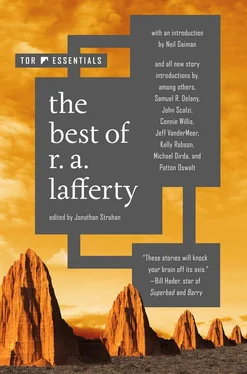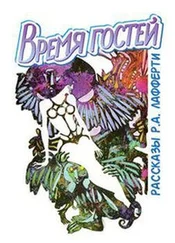Speculative fiction is a small community. It has its obvious flashy residents. Knight, Sheckley, Sturgeon, Bradbury, Clarke, Vonnegut. We see them and take note of them, and know what they’re about. But the community would not run one thousandth as well as it does without the quiet writers, the ones who turn out story after story, not hack work but really excellent stories, time after time. The kind you settle back and think about, after finishing them, saying, “That was a good story.” And you promptly forget who wrote it. Perhaps later you recall the story. “Oh yeah, remember that one about…” and then you wrinkle down and say, “What the hell was the name of the guy who wrote it? He’s done a bunch of things, you know, pretty fair writer…”
The problem is a matter of cumulativeness. Each story is an excellence, standing alone. But somehow it never makes a totality, an image of a writer, a career in perspective. This is the sad but obvious thing about R. A. Lafferty’s place in speculative fiction.
He is a man of substantiality, whose writing is top-flight. Not merely competent fiction, but genuinely exemplary fiction. He has been writing for—how many years? More than six, but less than fifteen? Something like that. Yet he is seldom mentioned when fans gather to discuss The Writers. Even though he has been anthologized many times, been included in Judith Merril’s Year’s Best SF on several occasions, and the Carr-Wollheim World’s Best anthology twice, and appeared in almost all the science fiction magazines. He is the invisible man. It will be rectified here. Raphael Aloysius Lafferty will emerge, will speak, will declare himself, and then you will read another extra-brilliant story by him. And dammit, this time remember !
Lafferty speaking: “I am, not necessarily in this order, fifty-one years old, a bachelor, an electrical engineer, a fat man.
“Born in Iowa, came to Oklahoma when I was four years old, and except for four years in the army have been here all my life. Also, one year on a little civil service job in Washington, D.C. The only college I’ve ever attended was a couple of years in the University of Tulsa’s night school division long ago, mostly math and German. I’ve spent close to thirty years working for electrical jobbers, mostly as buyer and price-quotation man. During WWII I was stationed in Texas, North Carolina, Florida, California, Australia, New Guinea, Morotai (Dutch East Indies, now Indonesia), and the Philippines. I was a good staff sergeant, and at one time I could talk pretty fair pasar Malay and Tagalog (of the Philippines).
“What does a man say about himself? Never the important things. I was a heavy drinker for a few years and gave it up about six years ago. This left a gap: when you give up the company of the more interesting drinkers, you give up something of the colorful and fantastic. So I substituted writing science fiction. Something I read in one of the writers’ magazines gave me the silly idea that science fiction would be easy to write. It isn’t, for me. I wasn’t raised on the stuff like most of the writers in this form seem to have been.
“My hobby is language. Any language. I’ve got at least a thousand dollars in self-teach grammars and readers and dictionaries and Lingua-phone and Cortinaphone courses. I’ve picked up a rough reading knowledge of all the languages of the Latin, German, and Slavic families, as well as Irish and Greek; but actually Spanish, French, and German are the only ones I read freely with respectable speed. I’m a Catholic of the out-of-season or conservative variety. As to politics, I am the only member of the American Centrist Party, whose tenets I will one day set out in an ironic-Utopia story. I’m a compulsive walker; turn me loose in a strange town and I’ll explore every corner of it on foot inside a week. I don’t think of myself as a very interesting fellow.”
This is the editor again, for a final comment. Lafferty is about as uninteresting as his stories. Which is to say, not at all. As entered for the prosecution’s case against R. A.’s contention that he’s a neb, the following story, one of my particular favorites in this book.
Note:The introduction above is reproduced from its original appearance in Dangerous Visions and is © 1967 The Kilimanjaro Corporation with the kind permission of the author.
“They came and took our country away from us,” the people had always said. But nobody understood them.
Two Englishmen, Richard Rockwell and Seruno Smith, were rolling in a terrain buggy over the Thar Desert. It was bleak, red country, more rock than sand. It looked as though the top had been stripped off it and the naked underland left uncovered.
They heard thunder and it puzzled them. They looked at each other, the blond Rockwell and the dark Smith. It never thundered in the whole country between New Delhi and Bahawalpur. What would this rainless north India desert have to thunder with?
“Let’s ride the ridges here,” Rockwell told Smith, and he sent the vehicle into a climb. “It never rains here, but once before I was caught in a draw in a country where it never rained. I nearly drowned.”
It thundered again, heavy and rolling, as though to tell them that they were hearing right.
“This draw is named Kuti Tavdavi—Little River,” Smith said darkly. “I wonder why.”
Then he jerked back as though startled at himself.
“Rockwell, why did I say that? I never saw this draw before. How did a name like that pop into my mind? But it’s the low draw that would be a little river if it ever rained in this country. This land can’t have significant rain. There’s no high place to tip whatever moisture goes over.”
“I wonder about that every time I come,” said Rockwell, and raised his hand toward the shimmering heights—the Land of the Great Horses, the famous mirage. “If it were really there it would tip the moisture. It would make a lush savanna of all this.”
They were mineral explorers doing ground minutiae on promising portions of an aerial survey. The trouble with the Thar was that it had everything—lead, zinc, antimony, copper, tin, bauxite—in barely submarginal amounts. Nowhere would the Thar pay off, but everywhere it would almost pay.
Now it was lightning about the heights of the mirage, and they had never seen that before. It had clouded and lowered. It was thundering in rolling waves, and there was no mirage of sound.
“There is either a very large and very busy bird up there or this is rain,” Rockwell said.
And it had begun to rain, softly but steadily. It was pleasant as they chukkered along in the vehicle through the afternoon. Rain in the desert is always like a bonus.
Smith broke into a happy song in one of the northwest India tongues, a tune with a ribald swing to it, though Rockwell didn’t understand the words. It was full of double rhymes and vowel-packed words such as a child might make up.
“How the devil do you know the tongues so well?” Rockwell asked. “I find them difficult, and I have a good linguistic background.”
“I didn’t have to learn them,” Smith said, “I just had to remember them. They all cluster around the boro jib itself.”
“Around the what? How many of the languages do you know?”
“All of them. The Seven Sisters, they’re called: Punjabi, Kashmiri, Gujarati, Marathi, Sindhi, Hindi.”
“Your Seven Sisters only number six,” Rockwell jibed.
“There’s a saying that the seventh sister ran off with a horse trader,” Smith said. “But that seventh lass is still encountered here and there around the world.”
Often they stopped to survey on foot. The very color of the new rivulets was significant to the mineral men, and this was the first time they had ever seen water flow in that country. They continued on fitfully and slowly, and ate up a few muddy miles.
Читать дальше




![Рафаэль Лафферти - Дни, полные любви и смерти. Лучшее [сборник litres]](/books/385123/rafael-lafferti-dni-polnye-lyubvi-i-smerti-luchshe-thumb.webp)
![Рафаэль Лафферти - Лучшее [Сборник фантастических рассказов]](/books/401500/rafael-lafferti-luchshee-sbornik-fantasticheskih-ra-thumb.webp)